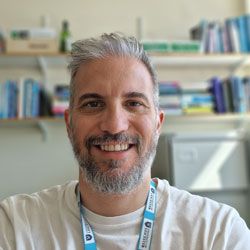
Spyridon Megremis
Lecturer in Microbial and Phage Biology
,
University of Leicester
Dr Megremis received an Honours in Research in Molecular Genetics from the University of Dundee (UK), and subsequently completed his PhD in Genetic Medicine from the Medical School of the National and Kapodistrian University of Athens (NKUA-Greece). During his first post-doctoral placement in the department of Allergy and Clinical Immunology (NKUA, Professor Nikolaos G Papadopoulos), he transitioned into the area of molecular virology and virus-host interactions studying the role of common cold viruses in chronic lung diseases. In 2014 he moved into the University of Manchester (UoM-UK, Professor Nikolaos G Papadopoulos amd Professor David L Robinson) to primarily investigate the role of the respiratory virome in asthma using metagenomics and systems approaches, and secondary to investigate the antibody repertoires in patients with autoimmune diseases (UoM-UK, Dr Janine Lamb). His work provided novel evidence supporting the role of the airway virome as an ecological system in the presence, severity and activity of asthma during periods of stable disease (asymptomatic/non-infectious). These data led to the EU-funded HORIZON 2020 FET programme “CURE”, the first to explore phage therapy strategies in patients with asthma with a focus on temporal patterns of airway microbiomes. In December 2022, Dr Megremis joined the University of Leicester and the Centre for Phage Research as a Lecturer in Phage Biology. His research focuses on the airway metagenome/microbiome and its ecology, the use of phage products for the management of complex ecosystems in the lung, and the development of virome- and microbiome-based prediction models of lung disease. He has a keen interest on the effect of the microbial and viral species antigenic variability in shaping the antigenic state of patients with chronic lung diseases. His research is based on observational (cohort studies), experimental (in vitro systems) and computational approaches using technical and theoretical frameworks from multiple disciplines.
Sessions
-
Respiratory Microbiome Dysbiosis and Temporal Dynamics in Individuals with Asthma29-Jan-2026Bacteria, Bugs & Big Data Stage
)